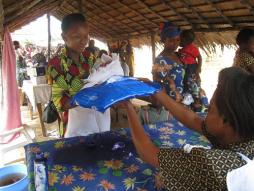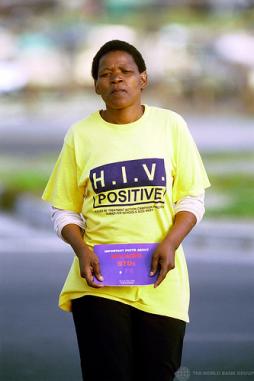Medical Records and Patient Management
Posted by LeighJaschke on Jun 18, 2009
Using Mobile Phones to Improve Child Nutrition Surveillance in Malawi data sheet 3593 Views
Author:
UNICEF Malawi, UNICEF Innovations, Mobile Development Solutions
Abstract:
This study is the result of a collaboration between Columbia University’s School of International and Public Affairs, UNICEF Malawi, and UNICEF’s Division of Communications Innovations Team in an attempt to use mobile communication devices to facilitate the surveillance of child nutrition in Malawi. As part of the pilot study, health workers at three district growth monitoring clinics were trained to submit child nutrition data via mobile phone SMS (text messages). Using an open-source software platform (RapidSMS), this data was received by a central server and automatically analyzed for indicators of child malnutrition. Health workers received instant feedback messages confirming the information sent and provided additional directions if malnutrition was indicated by the data received. Finally, a website was created to provide the Malawian government and other stakeholders real-time access to this data and its analysis. The report details the pilot study’s findings and outline recommendations for the future use of RapidSMS in Malawi.
This pilot study yielded a number of findings that may be applicable to other development projects using similar mobile phone technology. The results of this particular program included: Significant reduction in data transmission delay compared to Malawi’s current paper-based system. increase in data quality reported by health workers, elimination of the need for time-consuming manual data-entry, increased two-way flow of information between stakeholders at the national government level and health workers in the field, increased system and personnel monitoring capabilities, and elimination of costs related to transporting paper forms and manually entering data.
However, technology can only aid development within a limited scope. The true value of this innovation will be dependent on several other factors, including the integration of RapidSMS into the larger context of health activities and policy making in Malawi; the willingness of the Government of Malawi to take ownership of the platform; the ability to build and develop local technical capacity; and the maintenance of training and monitoring at all levels of participation.
Posted by LeighJaschke on Jun 18, 2009
Towards the Development of an mHealth Strategy: A literature review data sheet 2568 Views
Author:
Mechael, Patricia N.; Slonininsky, Daniela
Abstract:
This report maps out what is known about a broad range of mobile and wireless technologies and the contributions that they are making towards achieving health care objectives in low and middle income countries.
The report is divided into six sections: overview of mHealth as a critical domain within eHealth, review of health-related applications associated with mobile technologies, exploration of how various technologies are being used to achieve health objectives, documentation of key leaders and partnerships that have emerged to test and expand mHealth in low and middle income countries, critical considerations based on early initiatives and research, and key recommendations for next steps in the area of mHealth.
The report is based on an intensive study of peer-reviewed literature, program evaluation and industry reports, grey literature, and communication with a broad range of stakeholders. Recommendations include that key mHealth stakeholders focus their energies on the testing and scale-up of interventions. These interventions should show promise in achieving the key health outcomes as laid out by the Millenium Development Goals (MDG's) for health. Further, the report recommends that the World Health Organization (WHO) serves as a convener of key partners and a broker of mHealth strategies, information, and frameworks.
The potential of mobile communication technologies to reduce professional isolation, facilitate the work of overstretched human resources, and yield cost savings and efficiency is recognized. However, the report concludes that technological solutions should be designed according to local realities and meet local needs in away that practically and measurably contributes to the MDG's or health.
Posted by LeighJaschke on Jun 16, 2009
Cellphones for Health: An Exploration of Interventions in South Africa data sheet 1943 Views
Abstract:
There is global use of technology in medicine and health communication, leading to terms such as telemedicine, telehealth and e-health. A wide range of information and communication technologies (ICTs) has been used both in the provision of services, as well as in messaging and communication campaigns. In South Africa limited internet penetration has led to more experimentation with cellphones. This paper provides a discussion of these projects, focusing on: The Teen SMS Helpline of the South African Depression and Anxiety Group; SIMPill which assists with compliance to tuberculosis medication; and CellLife’s Cellphones for HIV programme. The projects are described, with reflection on the possibilities for the uses of cellphones in healthcare, weighing advantages and disadvantages, particularly in the local context.
Posted by LeighJaschke on Jun 15, 2009
The Role of Mobile Phones in Increasing Accessibility and Efficiency in Healthcare data sheet 2990 Views
Author:
Atun, Rifat A.; Greene, Stephen A.; Morris, Stephen; Thomas, Lucy; McKee, Martin; Franklin, Victoria; Coker, Richard; Urganci, Ipek G.; Samyshkin, Yevgeniy; Sittamplalam, Soalen R.
Abstract:
The Vodaphone Policy Paper Series No. 4 is a compilation of reports that look specifically at the contribution of Mobile phones in healthcare. The reports focus on the basic voice and text potential of mobile phones and identify opportunities for improved efficiency and effectiveness in service delivery where service provider-customer communication is important.
Moving the debate forward are reports made by experts who provide an analysis of the healthcare situation and their view on the contribution of Mobile phones in healthcare. Their analysis highlights three areas where mobile applications offer potential value to healthcare providers: Tracking inefficiencies in service provision by improving communication between service providers and users, improving the effectiveness of healthcare (and the risk of serious complications) through improved self-management and monitoring of patients with chronic conditions, and increasing the ability of hard-to-reach groups to access healthcare services by reducing the barriers of inconvenience, confidentiality, and privacy.
The Office of Health Economics (OHE) Consulting, contribute an overall analysis of healthcare costs in Western Europe and an assessment of potential applications of mobile phones in that context. Health Economists at the Tanaka Business School of Imperial College in London, NHS Direct, the University of Dundee and other institutions provide a series of case studies.
Reports included:
Upward Trend in Healthcare Spending
Analysis of Calls to NIH Direct
Review of Characteristics and Benefits of SMS in Delivering Helthcare
Potential Uses of SMS Applications for the Control of Tuberculosis
Use of Mobile Technologies to Enhance Control of Type 1 Diabetes in young People: Economic Evaluation
Posted by KatrinVerclas on Mar 15, 2009
This post was written by Marcia Stepanek of Cause Global where it was orginally published. Marcia graciously allowed up to repost it here.
Posted by KatrinVerclas on Feb 17, 2009
Using mobile phones has enormous potential for increasing access to healthcare for poor people aroundd the world, and for improving clinical outcomes. Now a new association, the mHealth Alliance, has been launched to support this emerging field and increase the scale and impact of the many small prokects around the world.
So new, the Alliance has so far no website, press release, or organization yet, it was announced to the BBC as part of the GSMA World Congress in Barcelona. The mHealth Alliance is currently under the auspices of three foundations, the UN and Rockefeller Foundations in the United States, and the UK-based Vodafone Group Foundation.
Deploying mobiles in health care in developing countries is not only promising for health outcomes, it is also a hot and potentially lucrative business area. There is enormous interest by NGOs, donors, telcoms, mobile vendors, researchers, and governments in the the use of mobile phones for increasing healthcare for the poorest people in the world.
Posted by on Jan 01, 1970
n/a
Posted by KatrinVerclas on Oct 07, 2008
How are social movements in the global South taking advantage of the ubiquity of mobile phones? Melissa Loudon, a researcher now working at the University of Capetown, looked at how the South African Treatment Action Campaign (TAC) is using mobiles in their work to advocate for a comprehensive HIV/AIDS policy in South Afric, and wrote this article based on her research.
Kevin Gillan, a researcher on the British anti-war movement, describes social movements as “definitionally collective and communicative”. Co-ordination of protest action, mobilisation of financial resources and strategic interaction would be almost unthinkable without information and communication technologies (ICTs). Although the importance of mass media to social movements has long been recognised, new ICTs burst on the scene in 1999 when demonstrators in the 'Battle of Seattle' orchestrated unprecedented protest action using mobile phones, email and the Internet. Ever since, ICTs have been accepted as an integral part of mobilisation in the North.



